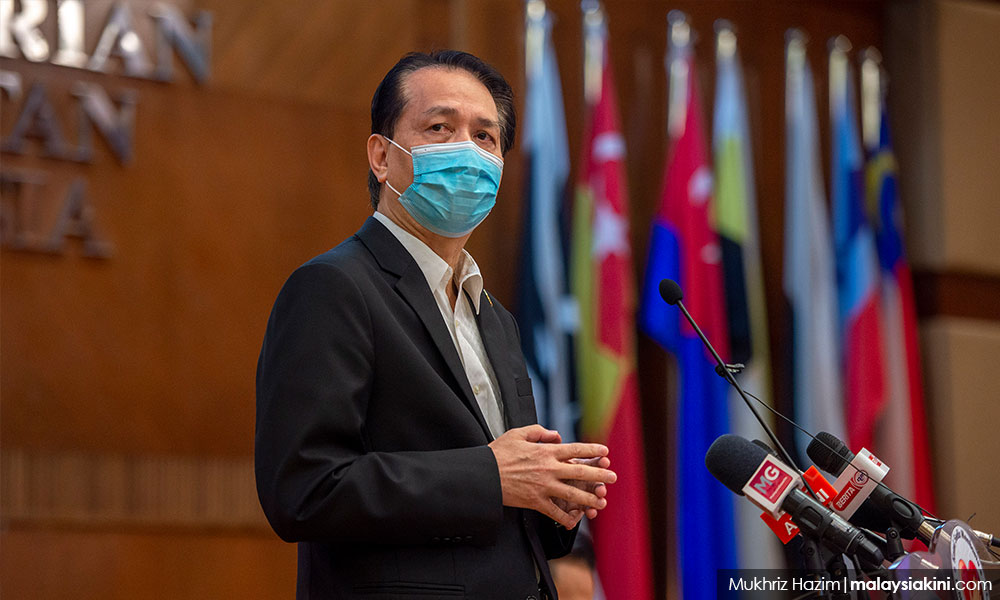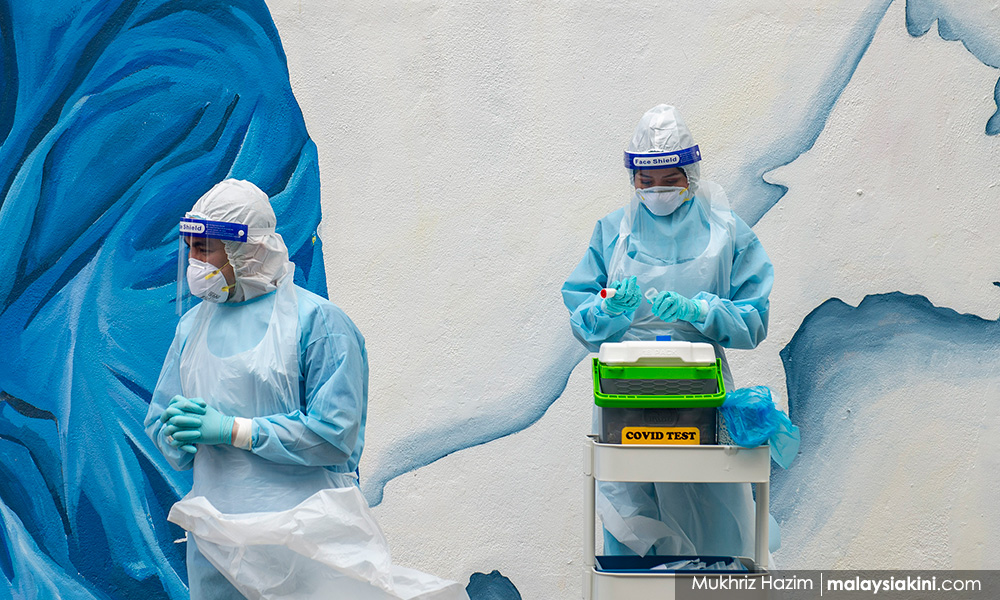COVID-19 | With the healthcare system at breaking point due to the surge in the number of Covid-19 patients, the Ministry of Health is trying several new approaches to ease the burden.
Yesterday, the ministry issued a new circular containing changes in contact tracing and priority for swab tests.
According to Health Ministry sources, they would no longer test every individual identified as close contacts to Covid-19 positive patients and instead only test those with symptoms.
"All close contacts must be identified, ordered to undergo isolation and monitoring at home. However, Covid-19 screening test would be done only on close contacts who are symptomatic," said the notice sighted by Malaysiakini.
In the case of contact tracing involving an infection cluster, only a number of samples would be taken, depending on the size of close contacts identified.
The circular states that it would suffice to take 20 samples if the number of exposed individuals in the cluster is less than 50.
"If the number exceeds 50, then it would suffice to take 30 samples, or 10 percent, whichever is lower."

Health director-general Dr Noor Hisham Abdullah (above), when contacted today, confirmed that the Health Ministry has mandated these new procedures.
He said the new plan was devised as they are now allowing Covid-19 positive patients to undergo isolation at their respective homes, or in the case of workers, at hostels or hotels at their employers' expense.
"This is a (new) working procedure because we are considering employing the method of quarantining at either home, hostel or hotel, besides hospitals and low-risk quarantine centres," he said in a text message.
"Priority is to test symptomatic individuals first," Noor Hisham added in another text message, without elaborating further.
The circular also states that close contacts who have been tested and found negative have to be quarantined "in cohort" at a suitable residential facility, based on risk assessment of the exposed individuals.
Quarantine will last 10 days from the last date of close contact with a Covid-19 positive patient. If any in the group starts showing symptoms for the virus, the individual must be isolated and undergo a swab test.
In the event an individual tests positive, then the other members of the cohort have to continue their quarantine for another 10 days.
Concern over risk of in-community spread
However, healthcare professionals have expressed concerns over how the new procedures would play out, considering the risk of the coronavirus being spread by asymptomatic individuals who would not be tested, albeit having been identified as at risk.
Dr Milton Lum Siew Wah, a member of the Malaysian Medical Council, said every close contact should be tested so that necessary action can be taken.
"Because an asymptomatic can later become symptomatic. A mildly symptomatic can become moderately or severely symptomatic (later on).
"It is important to test all contacts so that everyone is aware of his or her status and can take the necessary action to protect themselves and their contacts who are at risk of severe infection.
"Testing a small sample of close contacts does not contribute to controlling the spread," Lum told Malaysiakini.

Suspecting that the new procedures would have to do with the increasingly strained healthcare system and its testing capacity, Lum suggested that the Health Ministry adopts a "pooled testing" strategy.
Pooled testing is a method where samples taken from a group of people being quarantined together are tested as one sample to see if there is an infection. Should the result come back positive, then the group can be tested again individually.
Lum's concern was reflected in the findings by a team of US scientists, whose report on the spread of Covid-19 by asymptomatic persons was published by the Journal of the American Medical Association last week.
Titled "SARS-CoV-2 Transmission From People Without COVID-19 Symptoms", the report states that "...transmission from asymptomatic individuals was estimated to account for more than half of all transmissions".
They found that asymptomatic transmission accounted for 59 percent of all Covid-19 cases – 35 percent were pre-symptomatic, while 24 percent never developed symptoms at all.
"In addition to the identification and isolation of persons with symptomatic Covid-19, effective control of spread will require reducing the risk of transmission from people with infection who do not have symptoms.
"These findings suggest that measures such as wearing masks, hand hygiene, social distancing and strategic testing of people who are not ill will be foundational to slowing the spread of Covid-19 until safe and effective vaccines are available and widely used," the study's authors concluded.
Meanwhile, infectious disease expert Dr Christopher Lee told Malaysiakini that the change of procedures would be part of a mitigation strategy and containment approach.
"Due to the limitation of resources in testing and contact tracing capabilities, the authorities are focusing on those contacts who are symptomatic. This would allow them to admit and monitor the infected folks who have symptoms.
"The asymptomatic contacts would be asked to self-quarantine themselves," Lee said.
While it would make things more manageable for the healthcare system, Lee noted that the new approach also has its risks, where the onus is left to members of the public to comply with SOPs.
"This would be easier during the movement control order as restrictions are stricter, but maybe more difficult post-movement control order (MCO).
"Plus, hopefully, the home quarantine can be monitored adequately and efficiently," he said. - Mkini



No comments:
Post a Comment
Note: Only a member of this blog may post a comment.